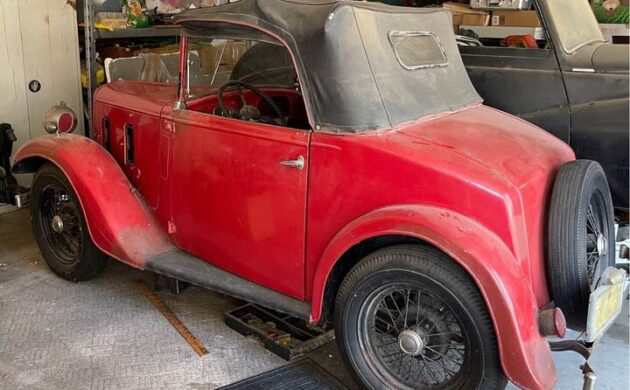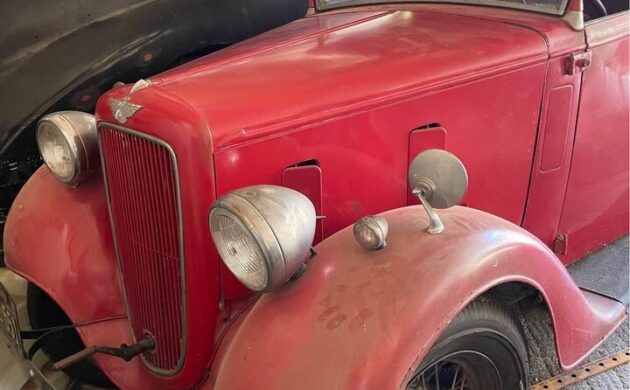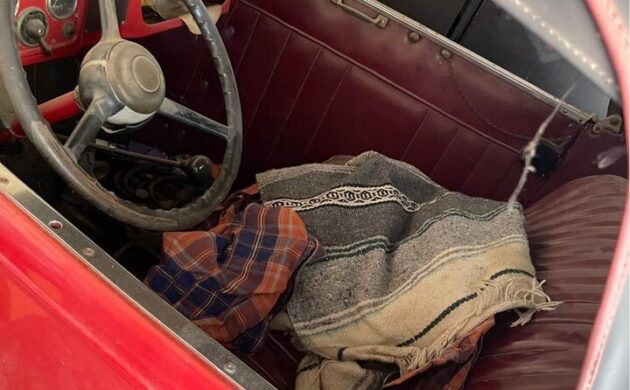Baby Austin: 1937 Austin 7 Cabriolet
Built in the UK and licensed in other markets worldwide, the Austin 7 (also Austin Seven) would become the British version of the American Ford Model-T. Its production run was long (1923-39), and the little car was available in a variety of body styles designed to appeal to those on a smaller budget. This 1937 edition in convertible (or Cabriolet) format looks to have survived nicely and may only need a little work to be in running condition again. Located in Yuba City, California, this little runabout is available here on Facebook Marketplace for $7,500. Thanks for the rare tip, Josh Sirota!
Because of its size, the Austin 7 was nicknamed “Baby Austin” and was one of the best-selling cars in the British market. It was so well-received that other brands started building versions of their own, with Austin’s approval. For example, the BMW Dixi was an Austin 7 as was the Rosengart in France. The American Austin Car Co. built some of them in the U.S. which may very well explain the seller’s car, although it could also be an import. All Austin 7s were powered by a 747-cc inline-4 engine.
We’re told the seller’s Austin 7 has only had two owners and covered just 40,000 miles in its 85 years. It looks to be in good shape overall and has no rust. There is no title, so a bill of sale will have to suffice. While the little car will start up, it needs a crankshaft pulley replaced. That’s the only shortcoming the seller tells us about. Since the car gives us the impression of being idle for a time, more attention will likely be needed. But what a cool title automobile! When was the last time you saw one?
Auctions Ending Soon
 2000 Jaguar XJ8LBid Now3 days$1,250
2000 Jaguar XJ8LBid Now3 days$1,250
 1977 Datsun 280ZBid Now4 days$275
1977 Datsun 280ZBid Now4 days$275
 1969 Ford MustangBid Now6 days$250
1969 Ford MustangBid Now6 days$250




Comments
You have to see one in person to appreciate how small these cars are. Friend had 3 of them, one like this one, a 2 door sedan, and a coupe. Asked me to help pull the engine to replace the clutch. After taking the radiator and grill off and unbolting the transmission, we just reached in from each side and lifted the engine out. With him at 5’10” and me at 5’6″, both of us in the coupe was real cozy.
That is not an Austin 7. Maybe an Austin 10. Rad shell and fenders are not 7.
It’s an Austin 7. The model is the Austin 7 APD “Opal” (nothing to do with the German auto manufacturer)
I stand corrected. I just have not seen that before.
Rad shell and wings (fenders) are identical to the ones on the ’37 cabrio I had in England.
Cute little car. Man sized Kidde car, Be great for parades and Cars& Coffee.
this would make a nice little hot rod
emphasis on little…
My uncle just finished building a bantam. Very similar in appearance. He placed a supercharged v6 from a Superbird under the hood. Fantastic little ride!
The American Bantam was originally a British Austin Seven design and engine until Alexis de Sakhnoffsky in 1937 visited the American Bantam factory in Butler, Pennsylvania, and designed a completely new front grille, new front fenders and new rear fenders. The Austin engine was also redesigned with a new aluminum induction system and cylinder head, retaining the 45.6 cubic inch (747 cc) displacement, but while adopting a fully pressurized oil system, increasing the compression ratio by 40% to a 7:1 ratio and implementing plain babbitt crankshaft bearings to produce 20 horsepower at 4,000 rpm, a 50% improvement over the Austin engine. (Thanks to Wikipedia)
The American Austin was not an Austin product. The name was licensed but the cars shared nothing other than resemblance.
What is the length,and width of this Austin 7 ?
Like to see if it will fit inside my Ford Van.
Do not like hauling trailers around.
Thank you.
This from the Cornwall Austin 7 club:
https://www.austin7.org/Technical%20Articles/The%20Differences/
10’7″ length, 5’3″ height, 4’3″ width
Go for it, so I don’t.
WIZZY The little car will not fit inside my van, maximum is 10′ length.
So far a 1956 Eshelman ,and 1922 Auto Red Bug fit.
Sorry about that !
I’ve seen many Austin Seven cars over the years, including dozens of the roadsters, but all had a rounded back area, not this boxy style. I suspect this was a coachbuilt variant, and original to 1937. Any Austin Seven experts out there who might be able to comment on the possibility of this car being coachbuilt? Abd if so, who did it?
check out http://www.austin7.org.You may find something there.